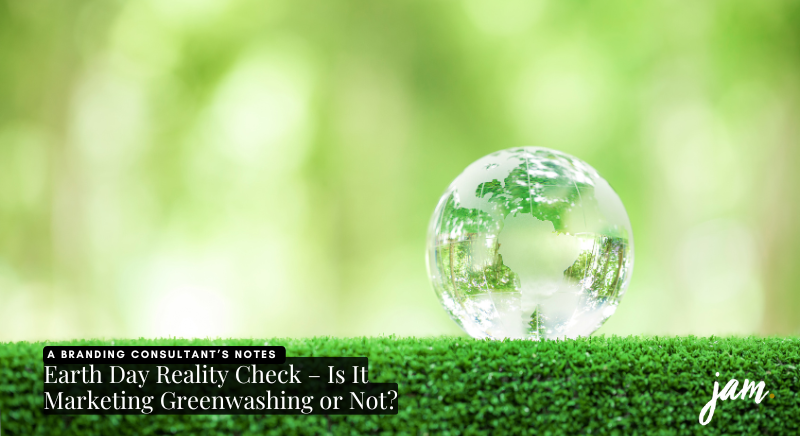
A Branding Consultant’s Notes:
Earth Day Reality Check – Is It Marketing Greenwashing or Not?
Sustainability has become a hot topic as global warming continues to press on. However, businesses that are jumping on the sustainability bandwagon have to be cautious. Marketing greenwashing can backfire in an impactful way if not done authentically.
Sustainability, or its negative counterpart, marketing greenwashing, has been on the minds of brands and businesses because of an appetite in today’s marketplace for a key demographic – millennials.
Look at the numbers that support this assertion:
- 63% of millennials are willing to spend more on sustainable goods than conventional items
- 88% of young consumers (Millennials and Gen Z) would rather buy from a brand that is committed to sustainability
- 83% of Americans (of any age) are concerned about the environmental impact of products they buy and feel it’s important for companies to design more environmentally friendly products.
This increased concern among consumers applies to nearly all industries, including, but not limited to, clean beauty products, environmentally conscious packaging, fashion and clothing, chemicals, pesticides, and cleaning products, as well as travel and fossil fuel usage.
Unpacking Marketing Greenwashing
What is Marketing Greenwashing?
Marketing greenwashing is when a brand attempts to create a false or unsubstantiated claim that it is actively working to improve the environment. This act of trying to fool the consumer can be done carelessly or with deceitful intentions. In my experience, most companies don’t realize it – especially when using AI.
The History of Greenwashing
Greenwashing is a term coined by environmentalist Jay Westerveld in 1986. It was sparked by a movement in the hotel industry that encouraged consumers to save their towels to help protect the environment. Still, the numbers showed little impact beyond saving hotels money in laundry costs.
Brands that made the mistake of marketing greenwashing have made headlines for decades. Check out some all-too-familiar stories:
- Chevron in the 80s – One of the first recorded instances of marketing greenwashing was with Chevron in the mid-80s. The oil behemoth launched a series of television and print ads touting its dedication to the environment while actively violating the Clean Air Act and Clean Water Act and spilling oil into wildlife refuges.
- Coca-Cola in 2022 – The blue-chip brand of carbonated beverages recently claimed its bottles were made from 25% recycled plastic. They were later exposed for being one of the world’s biggest plastic polluters. (Ouch!)
- Delta Airlines in 2023 – Delta Airlines announced in 2020 that it was carbon neutral, a claim that was proven false during a class action lawsuit filed three years later.
How To Avoid Marketing Greenwashing
Chevron, Coca-Cola and Delta are only a few examples of big brands that have fallen prey to false claims of sustainability. Ikea, Shell, Volkswagen, Keurig, H&M, Toyota, Kohl’s and more have all suffered fines and publicity damage due to this misstep.
Following are some tips to avoid the same fate:
Be careful with your words.
Avoid claims and language, such as eco-friendly or natural, that are not backed up by substantive and backed by data. Did I mention AI? We’ve noticed that AI uses over-the-top language. Be cautious with this.
Define what you mean.
Are you a green-conscious contractor or service provider? Are you a development company, property management company or property owner? What exactly are you doing that can be considered green? Here are some ideas:
- Have you included Florida Friendly Landscaping on your property? Spell out the fact that use the right plant in the right place and that you water efficiently.
- Are you a janitorial company that incorporates Green Cleaning? Spell out that you use green and Energy-Star Equipment, green sealed and green earth cleaning products and have a waste recycling program.
Use a third party to designate.
If your business truly qualifies as environmentally friendly, consider having a third-party audit process to show that you truly meet the benchmarks required to make certain claims. Check into:
- USBGC LEED – LEED defines best practices for healthy, high-performing green buildings. Better buildings.
- Energy Star – The energy performance behind every ENERGY STAR label is independently verified, whether on a product, a home, a building, or a manufacturing plant.
- GBI’s Green Globes® is a science-based, three-in-one whole-building certification system that evaluates the environmental sustainability, health & wellness, and resilience of all types of commercial real estate.
When it comes to illuminating your business’s impact on the environment, honesty truly is the best policy. If you are not doing any harm but not making a positive impact, it’s best to shy away from the sustainability angle. If you are doing the work, that’s fantastic! This is a great opportunity to educate your clients and employees.
Jackie Awve Marketing & Design specializes in helping businesses create marketing initiatives that drive results. Our industry experience includes commercial real estate, retail property, executive suites, trade associations, contractors and agency consulting. We are here to help you master the right messaging that is accurate and effective without the risk of backlash.
Let’s Work Together To Ensure Your Marketing Initiatives Are NOT Left to Chance.
Jackie Awve Marketing & Design specializes in helping businesses create marketing initiatives that drive results. Our industry experience includes commercial real estate, retail properties, executive suites, trade associations, contractors and agency consulting.

